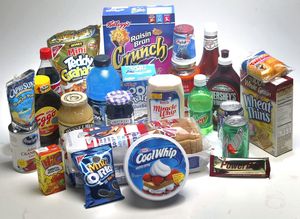Happy MORSELICIOUS Monday and Happy Passover! Did you have a grand weekend? What did you do? What greens did you eat? Did you move your body? Please share. Yours truly was busy creating mo’ recipes for my 2nd e-cookbook and OMG, are they MORSELICIOUS, if I do say so myself! 🙂
Today’s guest post is from Fooduciary’s Brad Shepherd.
This is your brain on sugar, literally; in pictures.
Fructose is a sugar found in almost all processed foods, in a very easily digestible state. Using MRI tests, scientists for the first time were able to document the reactions and processes in the brain after we eat fructose.
The MRI images showed that fructose consumption causes changes in the brain that directly lead to cravings for more food. Considering that two-thirds of adults and a third of American kids and youth are overweight or obese, this is a study that is worth our attention.
The federally funded study appeared in the Journal of American Medical Association in January. Researchers stated that drinking a fructose sweetened beverage doesn’t signal to the brain a feeling of being full. Considering the amount of fructose consumed today has almost quadrupled from what Americans were eating 50 years ago it’s no wonder our country is more obese than ever.
The researchers studied 20 young, normal-weight adults before and after drinking solutions of glucose or fructose in two separate sessions several weeks apart.
The MRI scans showed that glucose “turns off or suppresses the activity of areas of the brain that are critical for reward and desire for food,” according to a leader of the research team, endocrinologist Dr. Robert Sherwin of Yale University. “[With fructose], we don’t see those changes. As a result, the desire to eat continues. It isn’t turned off.”
Confirming the results, the scans mirrored how hungry the study participants said they felt. According to Dr. Jonathan Purnell, an endocrinologist at Oregon Health & Science University, the study “implies that fructose, at least with regards to promoting food intake and weight gain, is a bad actor compared to glucose.”
The next step of the study is to see if obese people react the same way to fructose and glucose as the healthy weight individuals did in the study.
Any nutrition expert worth their salt has been warning us for years to avoid any food that contains high fructose corn syrup. That’s a very helpful first step in avoiding highly processed foods that contain high levels of fructose. HFCS is found everywhere from salad dressings to chicken nuggets to pickles. It takes conscious effort to avoid it.
As controversial as it was, New York City’s ban on oversized fructose sweetened beverages could help lower the city’s consumption of fructose. All of us would be wise to follow the same example and limit our intake of sweetened drinks without being told to do it by our mayor. (No, you don’t get a pass by drinking diet drinks, which is only trading diabetes for cancer or depression.)
Despite what the corn refiners’ industry says, all sugars are not equal, even if they contain the same number of calories. Cane sugar is half fructose and half glucose, while high fructose corn syrup is 55 percent fructose. This is also why we stopped recommending agave syrup as an alternative sweetener. Depending on the brand, agave can be anywhere from 55 to 97 percent fructose.
Well what about fruit? That has fructose right? Yes, but in its whole form, the fructose is safely contained within fibrous cell walls. Fructose in whole fruit is accessed more slowly and its effects are blunted because of the fiber in the fruit. Fruit juices don’t carry the same benefit and instead can lead to dangerous spikes in blood sugar just like refined sugars.
If you find yourself consistently overeating, or struggling to lose weight, forget picking up the next fad diet book. Pick up your food, turn it around, and read the ingredients. Ditch the corn syrup and other refined sugars. Cook at home. Sweeten smartly and naturally. Eat real food and consider your new year’s resolutions in the bag!
Brad is the co-creator of Fooduciary.com – Happy Living through Healthy Choices. The closer to nature and the less tampered with any food is, the better it will be for you. The most important thing in healthy eating is to keep it real. For more visit: www.fooduciary.com/five-days-to-clean-eating.html



